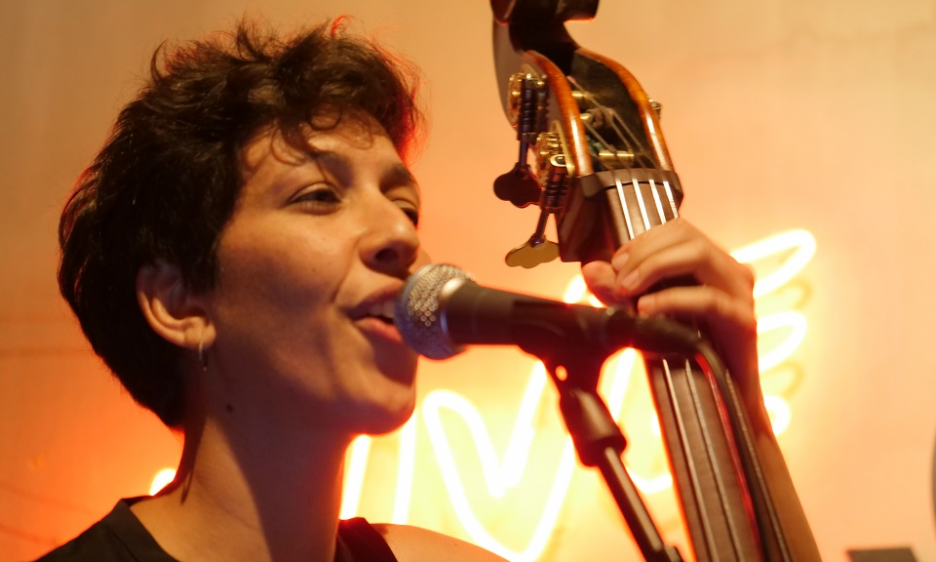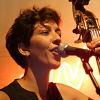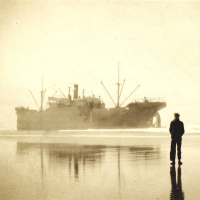Home » Jazz Articles » Interview » Donna Khalifé: On The Silent Wings Of Hope
Donna Khalifé: On The Silent Wings Of Hope

Free improvisation is a lot of work. It requires a lot of humility to accept whatever comes, but I like the fact that it’s an honest place.
—Donna Khalifé, bassist, singer, composer
Classically trained in Beirut and Paris, double bassist/singer Khalifé turned her back on that world to dedicate herself completely to jazz and improvisation. Her debut album, Heavy Dance (Self-Produced, 2017), was a feisty, odd-metred affair of strikingly original compositions and bold improvisations where angularity and beauty went hand in hand.
Khalifé's sinewy, wordless improvised singing fused with energized, fiery soloing from saxophonist Phillipe Lopes de Sa and guitarist Pierre Terygol. Electric bassist Florent Corbou and drummer Khaled Yassine forged a dynamic rhythmic partnership -one that had to be on its toes. At varying times, Khalifé's beguiling brand of contemporary jazz evoked abstract cabaret, sci-fi dream, or perhaps the soundtrack to a wildly outré circus. For sure, Heavy Dance marked the arrival of a singular talent.
In 2015, after twelve years studying and working in Paris, Khalifé returned to her native Beirut and picked up where she had left off -engaging with the city's best jazz musicians and taking improvisation to places rarely seen in a predominantly straight-ahead/bebop-oriented culture. Now Khalifé' stands over her second album, Hope Is the thing With Feathers (Self-Produced, 2019). The second album differs in a couple of important ways from its predecessor: the personnel has all but completely changed, with only Lopes de Sa remaining, but most significant is the change in the mood of Khalifé's music.
"With the first album I had just recently moved back to Lebanon. I guess I was still not really settled," explains Khalifé. "I was looking around me and I was finding no hope at all in my surroundings. I left France for the same reason. So, it's not here or there, but everywhere. I felt we live in a very decadent world. It was really a kind of scream about that."
If Heavy Dance was mostly punchy, restless and biting, the track "Hope? stood out for its introspective nature. It's a wholly improvised piece (the title came later) but the question mark suggested a certain state of mind. Fast forward to the second album and hope is no longer a question, but an affirmation, boldly placed on the album's cover.
It might not be too big a stretch to suggest that the two albums are conceptually linked, the first reflecting an absence of hope, the second embracing hope, although how conscious Khalifé was of this when writing the music is unclear: "It's not a conceptual thing, but at the same time it is. It's inside of me," Khalifé says, on reflection.
"For Hope Is The Thing With Feathers I decided just to try to work on myself because I will not be able to change the world, so let me maybe change my way and just try to see the beauty, the love. Maybe I'm being poetic, but it really is like that."
The album title comes from a poem by 19th century American poet Emily Dickinson that Khalifé had come across. "It was a pure coincidence that I read this poem by Emily Dickinson. I had been thinking about hope and this whole process was in my head. This poem came and I liked it a lot. It really touched me."
Dickinson's poem provided more than just the title of the album, with Khalifé writing music around the poet's words to effect one of the album's standout tracks. "To put the lyrics of a poem to music was something that I had never done before," says Khalifé.
For her second album Khalifé used her regular trio musicians; guitarist Raffi Mandalian and drummer Fouad Afra. Their collaboration dates back to before Khalifé's departure for Paris. "When I first started to play Fouad was always the drummer and Raffi too, so I always played with them. For me, they are the best here in the region and they really get what I want. I really love to play with them. Even when I was living in Paris I used to come to Lebanon, and they would play with me."
Arthur Satyan plays Rhodes electric piano on the album. "When writing I heard Rhodes on some tunes, in addition to guitar. Arthur is the best jazz player, not just in Lebanon, but in the region," says Khalifé. "His musicality, openness, generosity and friendship made it obvious that he should be on this project."
More than just a phenomenal pianist/keyboardist, Armenia-born Satyan has been an important influence on the wider Lebanese jazz scene since arriving in 1996, as Khalifé notes: "Arthur has done a lot for Lebanon. Before him there were no real jazz scene. Most of the jazz players in town today are his students, or at some point they were. He's the initiator of the jazz department in the national conservatory, and he's continuing to make the jazz family bigger and bigger."
Khalifé's classical background seeps into several tracks on Hope Is a Thing With Feathers with the participation of the Vindla String Quartet. Their standout contribution comes on "Uti Var Hage," a hymnal Swedish folk song that dates back centuries. Khalifé first came across the Vindla String Quartet during the Femena Festival, in Malmo, in 2017.
"I did a four-day residency in Malmo and then we performed together," Khalifé' recalls. "They explained the words of "Uti Var Hage" to me and it matched very much the theme of my life back then. It is about nature, it is about herbs and healing plants, which is something that I like, and how we always find joy in our hearts in nature. And it also talks about hope. It says, even if every day the sun goes down, hope is still there. It connects with the idea of Emily Dickinson that hope is always there."
After the success of their collaboration in Malmo, the Vindla Swing Quartet came to Lebanon in May 2019. With Khalifé,' the Swedish musicians performed a fund-raising concert as part of an ongoing project by Onomatopoeia The Hub to provide access to music for underprivileged children. While in Beirut, Vindla String Quartet also recorded for Khalifé's album. The haunting arrangement of "Uti Var Hage" is by violinist Caroline Karpinska.
The one musician who remains from Khalifé's debut, Heavy Dance, is French saxophonist Philippe de Lopes Sa. "When I was in France I didn't know him very much, but we had friends in common, and when recording Heavy Dance I decided that I really wanted him to play," says Khalifé. "It went really well. Philippe's an amazing guy, a very sweet human being. I knew he would give everything he had. He was here for the album release."
Backtrack to October 2019. Hope Is The Thing With Feathers is hot off the press and the launch gig is set for Metro Al Madina. Then, seemingly overnight, revolution breaks out. Mass, anti-government demonstrations are bringing Beirut to a standstill. Venues are cancelling gigs and closing up shop. Khalifé is faced with the dilemma of whether to postpone the launch and await less turbulent times, or to push ahead, unsure, however, if anyone would turn up.
"I was meditating on whether or not I should do the CD release," relates Khalifé, "because the revolution had started. In the end I thought, of course I have to maintain that date."
Khalifé's decision to go ahead regardless of the political turbulence can be read as an act of defiance and as one of hope. Her determination and faith were rewarded with a good crowd in Metro Al Madina and a successful launch. The musicians had been well versed in the music beforehand. "With this album I decided to play it a lot before recording it," Khalifé explains. "Every time I composed something, we would rehearse it and play it in gigs."
Khalifé chooses her gigs carefully, despite jazz gigs paying relatively well in Beirut, more, in fact, than in most European countries. "I don't play that often. One has to have a strategy, because Lebanon is very small, and Beirut is a village. In the same venue I play maybe once every two months, because the scene is very small, and the audience is small to be playing every week. In a month I try to play in two or three venues, at least that's with my project. I play other projects as well."
The other projects Khalifé refers to have included duos with regular drummer Fouad Afra, with violinist Dorothée Nodé-Langlois, and, in a completely improvised setting, with dancer Khouloud Yassine. Khalifé began collaborating with Yassine in 2013. "We arrive on stage and it is completely improvised. It's very challenging for me but I love that, I love the big risk," says Khalifé.
"It can lead you anywhere, also to bad places—I'm not saying it's always good," Khalifé laughs. "It's a lot of mental work. Free improvisation is a lot of work. It requires a lot of humility to accept whatever comes, but I like the fact that it's an honest place. In general, I think it is more work than anything written, and like written music, you have to work at it a lot."
Whilst Khalifé takes to risky, improvised performance settings like a duck to water, she's equally at home in more orthodox jazz settings. "I think I have, in a way, a double personality," she admits. "I do belong to the jazz scene in Beirut because I do some straight-ahead things and I'm always hanging with the guys. I'm always at the jam sessions, and I do play that kind of music. But when I'm doing my projects with my trio, and for my albums, it has to be my original compositions."
This desire to follow her own path—and to embrace risk—is probably what led Khalifé to abandon her classical studies in favour of jazz.
"I did a lot of classical studies, but jazz was always there because I used to listen to a lot of jazz, "Khalifé explains. "When I went to France to resume my classical studies I wanted to take it to the end, but the more you study, the more you realize what you really want to do."
At the conservatoire, Khalifé studied conducting and orchestration with Nicholas Brochot for four years. "When you study conducting you should play an orchestra instrument. It makes it a lot easier. So, I decided to fulfil my dream to play the double bass. The first time I played it I knew it was my instrument. I never felt something like that before."
A renowned conductor, Brochot also introduced Khalifé to her jazz/improvisation teacher, Guillaume Roy. "Those two people really had a very big impact on me," Khalifé acknowledges, "even in life, I guess."
In her early life, from the age of seven, in fact, Khalifé began her piano studies, but the discovery of the double bass whilst at the conservatoire more or less put paid to that. "I have completely abandoned the piano," Khalifé concedes. "I do play it, to accompany my students and to compose., but it's really more a tool for me than an instrument."
Even before her studies in Paris were complete, Khalifé realized that classical music was not to be her career path. "In the last year I understood that conducting is a really big, big responsibility. I also discovered that I am not passionate about all the classical repertoire, and you have to be super passionate," she recognizes.
"I realized that if I wanted to conduct anything it would be something like a jazz ensemble, or a small orchestra with some arrangements of my own. I really like arranging for orchestras, so it's an added tool to have, but I wanted to be in jazz. Conducting a jazz orchestra, or something like that, would suit me more than conducting Schumann, for example," Khalifé affirms.
The jazz scene in Beirut is, of course, much smaller than that in Paris, and much more conservative to boot. For many years jazz in Beirut jazz simply meant entertainment, and Khalifé admits that there is still an element of that. "There is this entertainment thing, it's true. Sometimes you have a gig, and nobody cares. You feel people are just there for entertainment and to drink."
However, Khalifé is optimistic that Beirut audiences' expectations of jazz are changing. "When I talk with people around me who go to jazz, and even sometimes among my students, they don't like anymore this idea that jazz is for entertainment with a nice-looking singer in front. I think this idea is changing a little bit, because audiences get bored when it's always the same thing and they don't come anymore. The scene has changed a little in the last ten years. Some groups are trying to push the music, to do something else. But it takes a while for things to get to another place. You have to think that twenty years ago there was no jazz here."
Things in Beirut have been challenging for musicians since the revolution began in October 2019, but Khalifé is positive about the future of her country.
"I really feel for the first time that there is something...there is hope," Khalifé says. "We have seen that something is changing. Before people were closing their eyes to some things. Now no more. They will not accept what was going on and what is still going on—the corruption that we see. Now the people are insulting the politicians, and this never happened before. It's incredible for me. Now, hell, they don't care!" exclaims Khalifé.
"There is hope because people for the first time are unified. Of course, I'm not going to say that everybody is unified or that a miracle is going to happen, but the majority of people who weren't having this discourse before, now they are having it. People are just more awake now and that's great. Since the revolution started it's the first time that I really feel content in my country," Khalifé adds. "We will never go back to where we were, that's for sure. So, for me, of course, there is hope."
In this changing socio-political climate, a change in Beirut's social fabric no less—no matter how small the baby steps—Khalifé feels that there is an audience for adventurous jazz such as her own.
"I think as long as you are true to yourself and it comes from your heart the audience is here. They are so open, I believe. I know that there are people who come to the gigs who are really happy when we are playing some of the things from the album. My audience is everybody who is willing to listen."
Photo: Courtesy of Donna Khalifé
Tags
PREVIOUS / NEXT
Support All About Jazz
 All About Jazz has been a pillar of jazz since 1995, championing it as an art form and, more importantly, supporting the musicians who make it. Our enduring commitment has made "AAJ" one of the most culturally important websites of its kind, read by hundreds of thousands of fans, musicians and industry figures every month.
All About Jazz has been a pillar of jazz since 1995, championing it as an art form and, more importantly, supporting the musicians who make it. Our enduring commitment has made "AAJ" one of the most culturally important websites of its kind, read by hundreds of thousands of fans, musicians and industry figures every month.





















